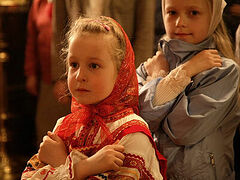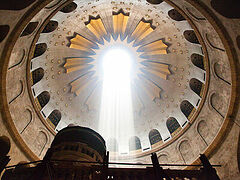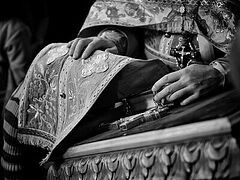My unknown friend, the tumult of the earthly world
Will be healed forever by the constancy of Heaven.
Hieromonk Roman (Matyushin-Pravdin)
How can a man restore his spiritual peace if he’s lost it? How can he preserve it in an environment of uncertainty, overwhelmed by all sorts of fears? These questions are answered by several priests of Moscow’s Sretensky Monastery.
If we humble ourselves and trust God, we’ll live peacefully. The point is to humble ourselves under God’s mighty hand. Archimandrite John (Krestiankin) advised people not to rush to stretch their minds into tomorrow and not to forget that only God rules the world: “Life is difficult now; a spate of frightening information shakes an already fragile balance. In order not to react so painfully to these storms stirred up by the enemy, we must firmly believe that God alone rules the world, and try, as far as possible, to live according to God’s commandments.”
And he also said: “My dears, children of God, believe in God and always trust in His good will for us! Accept everything in life—both joy and gloom, prosperity and evil days—as the mercy and truth of the Lord’s ways. And fear nothing in life but sin.1 Only sin deprives us of God's favor and puts us at the mercy of the enemy’s arbitrariness and tyranny. Love God! Love love and love each other to the point of self-sacrifice. The Lord knows how to save those who love Him.”
From time immemorial, the Russian way of thinking has been characterized by abstractness. Sometimes there’s uncertainty. How can you precisely answer someone: “Do this or that to acquire spiritual peace,” when it’s unclear why he’s lost his spiritual peace?
When we wonder, for example, how to fix up a house, any expert will ask you to show him what the crack looks like and how long it’s been growing. Likewise, when we go to a doctor, he starts asking a million clarifying questions. So it’s impossible to give a precise answer to a general question.
But, interestingly, there are many cases in the Egyptian Paterikon when a brother came to an elder and asked the abstract, indefinite question: “Abba, what must I do to be saved?” We don’t know how long these conversations were and what the two talked about, but in the short sayings of the Egyptian Fathers we often find answers like this: “Flee from sin and you’ll be saved,” or: “Stay in your cell, and it will teach you everything,” or: “Silence is the key to salvation.” This leads to the conclusion that it wasn’t a conversation of strangers who were meeting face-to-face for the first time, but of people who knew each other’s daily living conditions very well, and maybe had been living next door to one another for years. And in this case what was needed was not a three-hour conversation laying out the basics of salvation, but just some brief adjustment.
And it’s easier to answer such questions when a man turns to his father confessor who has known him for a long time, who has the opportunity to understand and get to the bottom of the problem, and then the answer will be clear as to what exactly he should do.
Hieromonk Athanasius (Deryugin):
Indeed, spiritual peace is what every Christian needs. But sometimes it’s very hard to be in a peaceful state. What can help?
It’s hard to answer this question unequivocally. And perhaps a lot depends on the character and circumstances of the life of each particular person. We can suggest some ways that the Holy Fathers advise us.
 Hieromonk Athanasius (Deryugin)
Hieromonk Athanasius (Deryugin)
The first and perhaps most important thing is prayer. Moreover, it’s not so much the prolonged reading of prayers that contributes to spiritual peace as a short, frequently repeated prayer—for example, the Jesus Prayer, or a prayer said in your own words.
The second is being in church. We all know how much easier it is to acquire spiritual peace in church, during church services, where everything sets you up for a conversation with God. The more often we attend church, the easier it is to acquire spiritual peace.
And the third thing, which may seem somewhat cruel, but which the Holy Fathers also wrote a lot about, is the memory of death. When we’re in turmoil, busy with many things, or worried about something, it’s helpful to remember that we could die at that moment and stand before God. From this thought, everything immediately falls into place, and you immediately understand what is truly valuable and what’s not at all.
I think all our uncertainties and fears can and should be turned into prayer. We worry about what’ll happen tomorrow, how our lives will be arranged. We can just stand in front of our icons and pour out all these experiences before God. Then they won’t be useless at all, because only prayer can be useful in cases where we physically can do nothing. These experiences, which have become a prayer, will bring us spiritual peace.
It seems to me that a man loses his inner spiritual peace when he doesn’t entrust himself into the hands of God, when his relationship with God is built not on love, not on faithfulness to Him, but on a search for miracles; when God is perceived by a man as a “magic wand,” as a kind of tool that helps him in everything. And when he faces difficulties, he immediately begins to give up, to look for outside help, and relies on his own strength, which results in the loss of peace in his soul.
Taking a good look at the lives of the martyrs and the New Martyrs, we marvel at how readily, with what ease and joy they went to their cross, how they sought God not only in the beautiful things that surrounded them in life, but also in the terrible things they were immersed in—the difficulties, the circumstances that fell to their lot, on their shoulders, hardened their faith. And it was then that they came to realize what real prayer is, what faith in God is, and that we can truly appreciate our faith in God when we experience difficulties.
So we lose peace of soul because of our lack of faith, because of our unbelief and distrust of God. If we were always guided by the principle that everything in life happens according to Divine providence, if we remembered that out of the seemingly most terrible things the Lord is able to make something important and useful not only for us, but also for our neighbors, and if we constantly lived in the presence of God and walked in His sight, there would be no fears in our lives.
If we look closely at the book of Genesis, we’ll see that, having violated God’s commandment for the first time, our forefathers experienced nothing but fear, feeling absolutely autonomous and independent, abandoned and empty. And so this fear continues to this day, until a man begins to seek God, to walk towards Him, and to follow the commandments of God.
Did Adam and Eve feel fear before the Fall? No. They had reverence for God, awe. They had the fear called the saving fear of revering God. It was true love for God. And in order to preserve spiritual peace in a situation of uncertainty, we need to read the Gospel more often, the lives of the saints, about the podvigs of the martyrs, the New Martyrs, which always strengthen and instruct us in the faith.







